Eco-defence podcast episode one – an interview with Coal Action Network
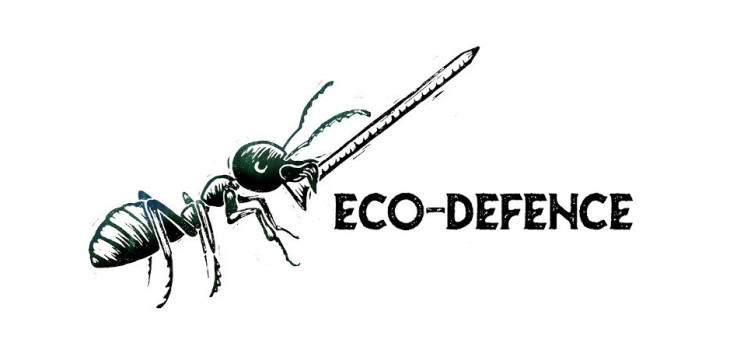
This is the first episode of Corporate Watch’s eco-defence podcast miniseries. Recorded at last year’s Earth First! Gathering.
You can listen to the podcast by clicking the play button below:
TRANSCRIPT:
00:01 Tom – Corporate Watch
Hello and welcome to the Corporate Watch podcast. My name’s Tom, and I’d like to welcome you to this first episode in our eco-defence miniseries of interviews that we gathered at the UK’s Earth First! Gathering. Featuring interviews with comrades involved in campaigning against the ecological destruction that’s caused by corporate greed.
But before we start, here’s a word about us:
Corporate Watch is a research group that helps people stand up against corporations and capitalism. We investigate exploitative bosses, landlords and property developers, companies profiting from prisons, profiting from deportation flights, from animal exploitation and more, as well as the mega-corporations devastating our planet – and the wider systems of power and profit they work within.
At the heart of everything we do is our idea of “information for action”. We know that people can fight and win, even against powerful enemies like corporations and governments. Good information helps to understand the forces we’re up against, spot their weaknesses, and so campaign effectively.
This is our first venture into the world of podcasts – so we apologise if things aren’t as polished as they could be. Because of this, it’s also taken us a good while to get these interviews ready for broadcast, so we’ve provided updates to the original interviews where that’s proved necessary. This interview – for example – includes an update on the situation as of March 2023.
All of these interviews were recorded outside, in the midst of an ecological direct action gathering – and you might hear the noises of people preparing the dinner, or shouting for the next workshop, and so on. We hope that all this adds a sense of atmosphere to the interviews.
Okay, so without further ado, here’s our first interview of the series.
[cut to the interview from the Earth First! gathering]
01.39 Tom – Corporate Watch
Okay, so I’m here with Daniel and Anne from Coal Action Network. And [the] first question I was gonna ask is about the Coal Action Network campaign, about how long it’s been going on for and what the aims of the campaign are?
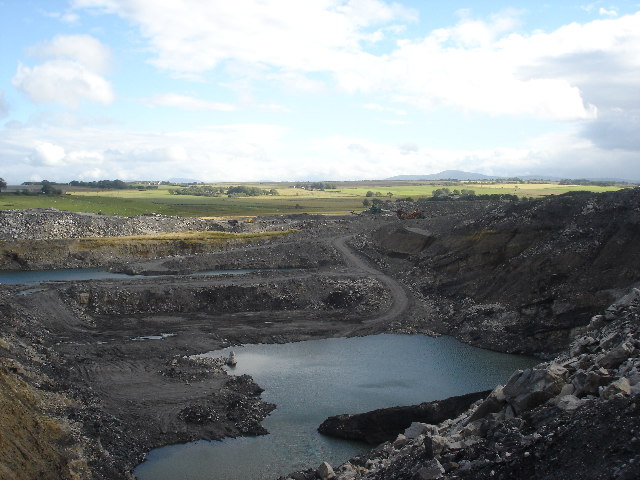
An opencast coal mine in South Lanarkshire
01.50 Anne – Coal Action Network
So Coal Action Network started around 2008. It came out of an Earth First! gathering because at the time, there [were] around 45 new open cast coal mine applications proposed, and a similar number of operating open cast in the UK. So it was a big issue. The amount of carbon that’s released by the burning of the coal from the mines is significant, but also the environmental devastation on a local environmental level, when everything over the coal is destroyed. So all of the habitats, [and] the biodiversity is taken away. The very bedrock is taken away right down to the coal itself. And this has a huge impact on local communities and the local communities were… very isolated in their own fights. And they felt like it was only them – only their village – that was affected. And so, the Coal Action Network was formed, originally under a different name. It was formed in order to unite the groups together so that they could share their learning. And so that people could take direct action as well as working through the planning system.
02.46 Tom – Corporate Watch
Can you tell me a little bit about some of the successes of the direct action and the campaigns against coal over the years?
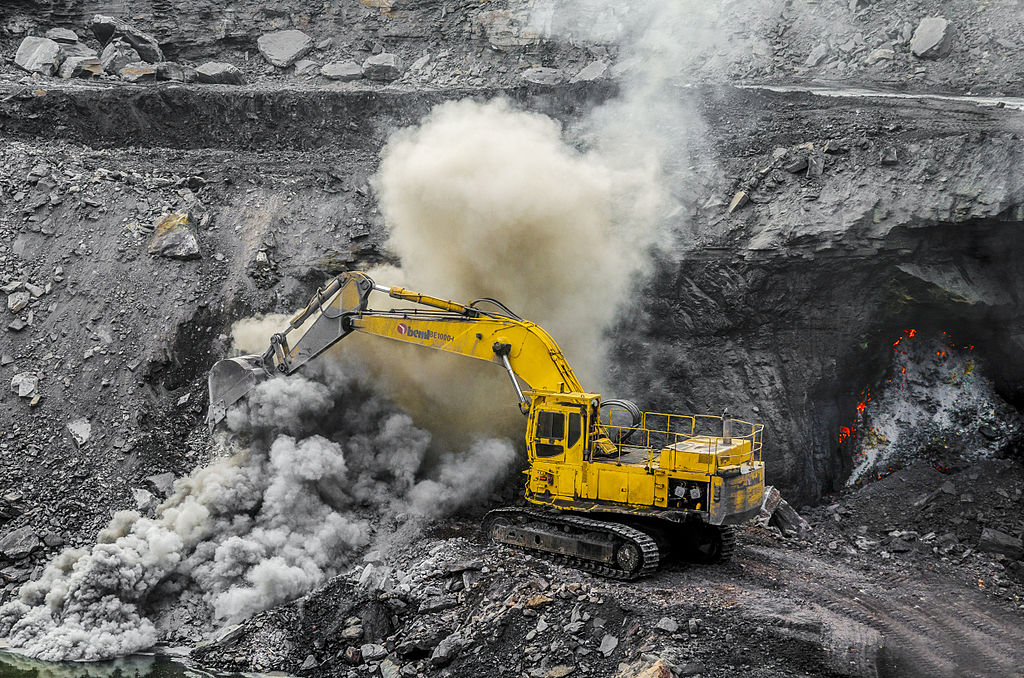
02.52 Anne – Coal Action Network
So over the years, we have fought a lot of campaigns, we didn’t end up fighting all 45, they weren’t necessarily necessary, but we stopped 22 open cast applications or extensions… 2020, was the kind of the end of that era – where we stopped: a new application at Druridge Bay, a new application at Dewley Hill and stopped an extension at Bradley in the Pont Valley. So that was a kind of accumulation of the work. But lots of people – community activists, environmental activists – over the years fought against these applications, through all sorts of different methods. Very much a holistic approach to fighting the campaigns. And in 2018, things kind of came together in the campaign to protect Pont Valley, where we had a big protest camp. That lasted, I think, for 54 days. We had the camp and then after that, there were further actions against the mine, sadly, the mine did happen. It did succeed. It had been rejected… by the local council in 2011. And then it had been approved at a second appeal. So it was like a really long drawn–out process, and the local community were really downtrodden because they felt like the mine was going to go ahead. And then we all came together for this really empowering, but sadly, ultimately unsuccessful campaign to stop the mine.
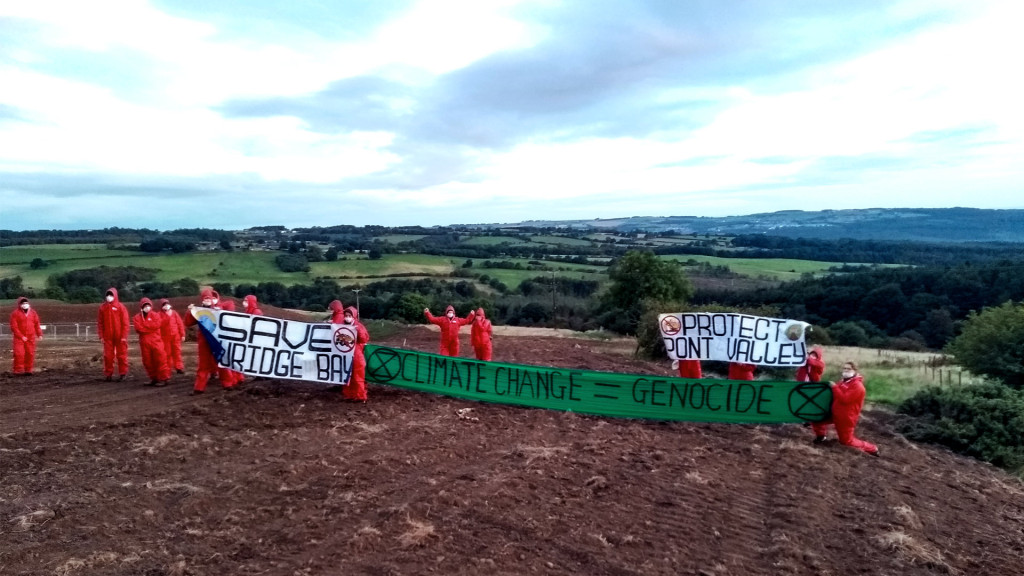
Demonstration at Bradley mine in the Pont Valley (photo via Glen Black)
But, in a way, it wasn’t unsuccessful, because the coal mining companies like to expand, because there isn’t [just] coal in a small pocket. They kind of keep eating up a whole valley and moving down the area. And because of the campaign to protect Pont Valley, and how successful that campaign was at making the headlines and keeping the issue in the news when they asked for an extension application, and to get even closer to people’s houses, they were rejected. So that was a big turning point for us.
But there were a lot of other camps prior to that. In Scotland, there were Coal Action Scotland camps, there was a camp in Huntington Lane [in Shropshire], they were across the coalfields of the UK. And yeah, lots of different types of tactics kind of brought about that change, to see we’re very near to the end of open cast coal mining in the UK. There’s a couple of mines operating, and there’s one extension application, but it’s a very different picture to the one that we started with when we started Coal Action Network.
04:50 – Tom – Corporate Watch
And is there anything from that history of campaigning that really sticks out as like a really inspiring moment or a really inspiring action?
04:59 – Anne – Coal Action Network
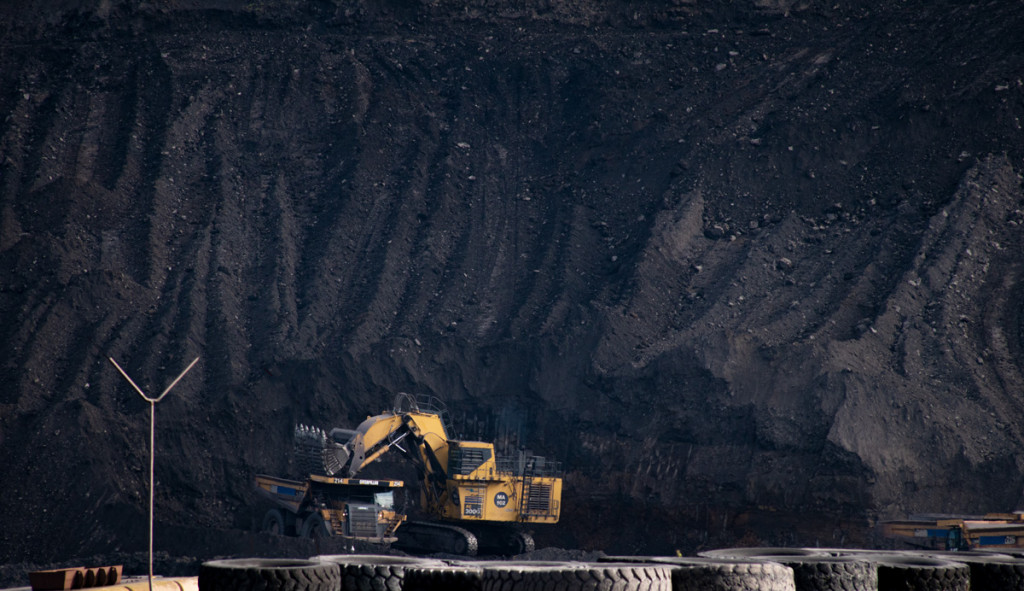
via Coal Action network
There was an action in the Pont Valley that really inspired me, we went to the company that was building the access road to enable the coal mine. The access road had to be completed before the third of June, otherwise, the coal mine wouldn’t be able to start. So it was very clear for us that if we stopped the access road being built then we would stop the coal mine and we were successful in that. Sadly, the authorities didn’t care. But the action – what was inspiring for me about it – was that three non-binary people blocked the road. And the support involved quite a lot of local queer women who had never been part of anything like that. And just seeing those movements come together, and people fighting for the area where they lived and an area where they had just met and people coming together in a fantastic action where ultimately, the road building company built a new road out of its own compound [laughs]. You can’t predict everything that might happen. But we won that, we stopped them from building their access road in the time available. And then the authorities pushed through the mine despite that happening, but there were lots of successes along the way – even though we weren’t successful in stopping the valley… from being destroyed.
06:02 – Tom – Corporate Watch
And, what’s the situation now? You were saying that opencast is less of an issue for you now, can you explain that? And talk about what is going through the planning process in terms of new projects?
06.13 – Anne – Coal Action Network
So open cast has become much less of an issue because of the obvious environmental impact locally, whereas [for] deep mining the environmental impacts are less clear. But the global environmental impacts are much greater because there’s a much greater amount of coal that’s extracted. When the organisation started, we were fighting coal mines… which provided power for power stations, so for the electricity grid. Though, there was a point when the UK was using 40% of its electricity coming from coal and now it’s down to less than 3%. And so there’s been big changes in that, and the government has said it will phase out coal by 2024. However, when they say phase out coal what they mean is close the power stations, they don’t mean stop the mining. And coal is not only used in power stations it’s also used in steelworks – is the second biggest – or has now become the biggest consumer of coal and so, things have changed in that direction.
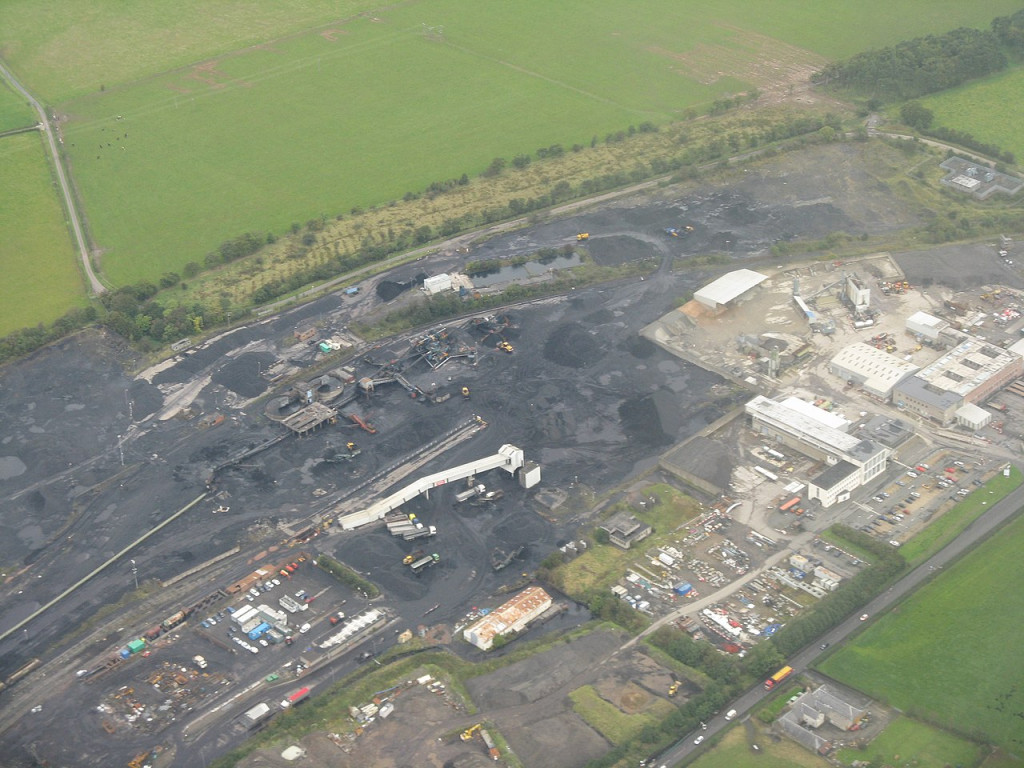
Scottish Coal site – aerial view
07:07 – Tom – Corporate Watch
And did you want to talk about the current projects that are going through the planning process and that are live at the moment?
07:13 – Daniel – Coal Action Network
So we do have a working open cast coal mine in South Wales called Ffos-y-Fran, that is due for closure on the sixth of September [2022] this year [but the mine has applied for an extension], so, at that point, there shouldn’t be any active opencast coal mining in the UK. We are looking at an extension for Glan Lash, also in South Wales, that is opencast – [they] currently don’t have a licence to operate but they are looking to extend a coal mine. There’s also a deep coal mine in South Wales called Aberpergwm, that is going to mine 42 million tonnes of coal, so it’s a large extension.
Coal Action Network has launched a judicial review against the decision for that extension to go ahead. And we’re likely to have the hearing for judicial review around January or February 2023. There’s also Whitehaven which is being widely publicised in West Cumbria, that is a deep coal mine that is awaiting a determination by the Secretary of State in October [2022]. And finally, there’s a coal mine that’s at a very early stage in the planning process on the Scottish/English border, in Dumfries and Galloway. I think what’s really critical about this is all of these coal mines are claiming to primarily mine coal to make steel. So the government cut off for 2024 for coal for power in the UK, [and] these applications will be completely unaffected by that target. Globally, the steel industry uses a billion tonnes of coal every year to produce 1.7 billion tonnes of steel, that process emits 11% of global greenhouse gases. If we don’t solve this we can’t get a handle on climate change. It’s a really key issue, and not enough people know about it. In the UK, these four coal mines cumulatively – that are going through the planning process at the moment – account for 140 million tonnes of coal, that will produce around 430 million tonnes of CO2.
We need to get active on steel, and we need to stop the steel industry from consuming the level of coal it currently does. In the UK. There are two main steelworks in the UK that consume huge quantities of coal. The largest of those is in Port Talbot. And it’s called Port Talbot steelworks, it’s owned by Tata Steel. The other one is British Steel in Scunthorpe. These account for the second and third highest sources of [CO2] single–site emissions in the UK.
09:46 – Tom – Corporate Watch
So could you tell me about the companies that are involved in these four projects?
09:52 – Daniel – Coal Action Network
So in Whitehaven, the company behind the coal mine is called West Cumbria Mining Limited, they are majority owned by a Singaporean investment company serving people in Australia and elsewhere. Aberpergwm is run by Energybuild Ltd. They bought the coal mine in 2004. And we suspect that they might sell the coal mine at some point in the future to another coal–operating company. And there’s Lochinvar which is owned by New Age Exploration Limited – rather dystopically named – and they run gold mines in New Zealand and Australia. And they, until recently. also owned a stake in a tungsten mine in Cornwall but sold that. And finally, Glan Lash is owned by Bryn Bach Coal Limited.
10:40 – Tom – Corporate Watch
And out of those four projects, which one do you think is likely to be a campaigning focus in the near future?
10:47 – Daniel – Coal Action Network
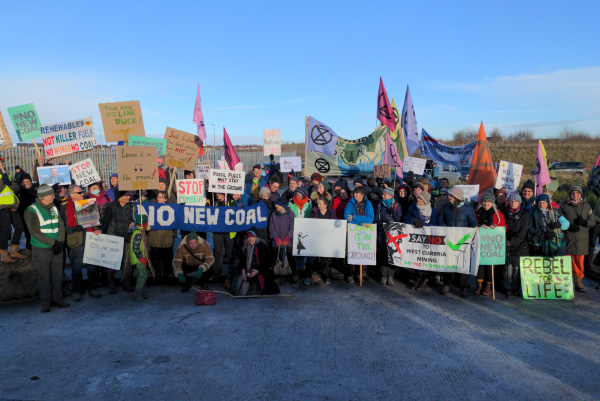
A demonstration in support of legal challenges to Whitehaven coal mine
So in the order that these coal mines are in the planning system, Lochinvar is the earliest and then Glan Lash which is currently awaiting a determination by Welsh Ministers. Whitehaven is awaiting a determination by the Secretary of State in October [2022] [update – this has now been approved, but is subject to a legal challenge]. So that’s coming up quite soon.
And Aberpergwm is a massive extension. We’re looking at a judicial review in January or February [2023] with an outcome from that several months later. We’re hoping to win. We’ve got a crack legal team and it’s looking optimistic. If we don’t win, there are no other options than direct action. And we really hope that people will come out and join us in taking direct action against that coal mine from happening.
Whitehaven – we’re expecting a decision on that very shortly. But there are other options that might be explored before direct action becomes the last option available to us.
11:49 – Tom – Corporate Watch
And how will people who want to support that direct action know, where should they look for information?
11:55 – Daniel – Coal Action Network
Coal Action Network, we share our information [through] our mailing list, which you can sign up for on our website. We put out information via Twitter and Facebook. I’m afraid we’re all a bit old to be putting information out on Instagram. But we would appreciate it – if you see that information – to share it amongst yourselves on Instagram. So keep your ears peeled and follow us on our socials and our mailing list, so you can find out news as it happens.
12:20 – Tom – Corporate Watch
Okay, and I wanted to ask – what do you think that the campaign… the struggle that you’ve had so far highlights about the links between the coal industry and corporate power and greed in general?
12:35 Anne – Coal Action Network
So there are lots of examples of how the coal industry links into corporate greed and how the state protects that. For example, when opencast coal mines start, they produce a lot of waste, what’s called overburden – everything that’s over the rock, and it costs millions of pounds to put that back. Coal companies don’t make any money whilst they’re putting that back. They’re supposed to put money to one side to pay for that later. However, often what these companies do is set up shell companies – subsidiaries. For example, Celtic Energy in South Wales escaped over £100 million pounds worth of restoration costs on four different sites, so Selar, Margam, East Pit, and Nant Helen.They created companies that were based in the Virgin Islands and gave them names that weren’t related to coal, weren’t related to the business… things like Ash Energy and Oak… and things like that. So subsidiaries that are basically meaningless.
UK coal did it as well. They also went for the plant theme and called it Juniper Number Three.
So they create these companies that then own the land, the land that is opencast – and the actual company behind the whole thing keeps operating the site, but the liability goes with the land. So planning permission goes with the land and who has to put it back goes with the land. If that company is then in the Virgin Islands and the Cayman Islands abroad, then there’s no recourse for that to ensure that restoration happens.
Consequently, local communities who were promised to get their footpaths back, to have the water that fills in the void dealt with safely, to have woodland planted or whatever – kind of things that we know are bullshit remediation -those don’t happen. And so communities who’ve dealt with all of the dust, all of the noise, all of the loss of amenities, lose everything once the company has gone. In the case of Celtic [Energy], it went to involve the Serious Fraud Office and it involved a court. And the people high up in the companies had their premises raided, [and] they were arrested. And when it went to court, the judge said it was dishonest, it was wrong, but there [was] nothing they could do. It was legal. And that just shows that the state is set up – as we all know – to criminalise people who try and create a better world and a more sustainable world. It isn’t set up to penalise the people who have a lot of money, and who walk away having extracted from places, which have had the negative impacts of coal, and then none of the benefits – and so it’s just another example that we’re well aware of, of the way in which the state benefits and companies benefit, and local people don’t.
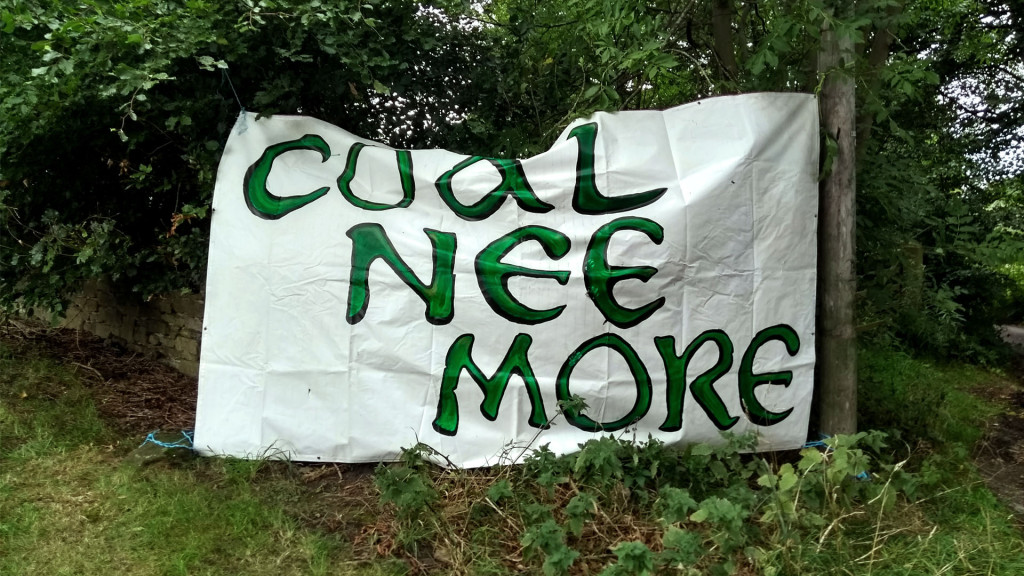
photo via Glen Black, from a protest in the Pont Valley
15.02 – Tom – Corporate Watch
And the last question I had was, out of all those years of struggle against the coal industry, what do you think the lessons are, that comrades that are involved in struggles against corporate power, can learn or take from the struggles that you’ve been involved in?
15.15 – Daniel, Coal Action Network
So in my experience, the things that we can see through the work that we’ve taken on coal, that are equally relevant in other contexts are that communities that resist coal mines or resist extractivist projects are much more successful when the community works together. If there’s like land being bought and things like that, the communities need to work in partnership with their neighbours. And that community groups that start up around the point where a planning application is expected, they are most strong and most likely to win if they fight on other issues in their local area.
So if they create positive events in their area, or they tackle other problems, that they have – other environmental problems that they have – they’re more likely to stay together as a cohesive group and then be able to re-invigorate themselves on the issue of coal, or whatever extractivism it is, at a later stage.
I would also say that it’s really important to break down the narratives of ‘activists’ and ‘local people’, I think, sometimes I fall into it myself! But that, that we’re all part of the same struggle, and that the struggles that can seem fairly single issue [do] inspire people and enable people to meet connections that they wouldn’t have otherwise met. And also that within direct action movements, it’s very easy to [think] that direct action is the most successful thing, but often the fairly dull dealing with the planning system can actually result in a secure victory. And that direct action is often necessary at the last point when we really don’t have anything else. And so it’s better if we can stop getting to that point because it’s [the] endgame. Whereas if we can stop it at planning, or you can stop it through other methods, then that’s better, it’s a bit more laborious, it’s a different sort of way of working, but it can give really useful results.
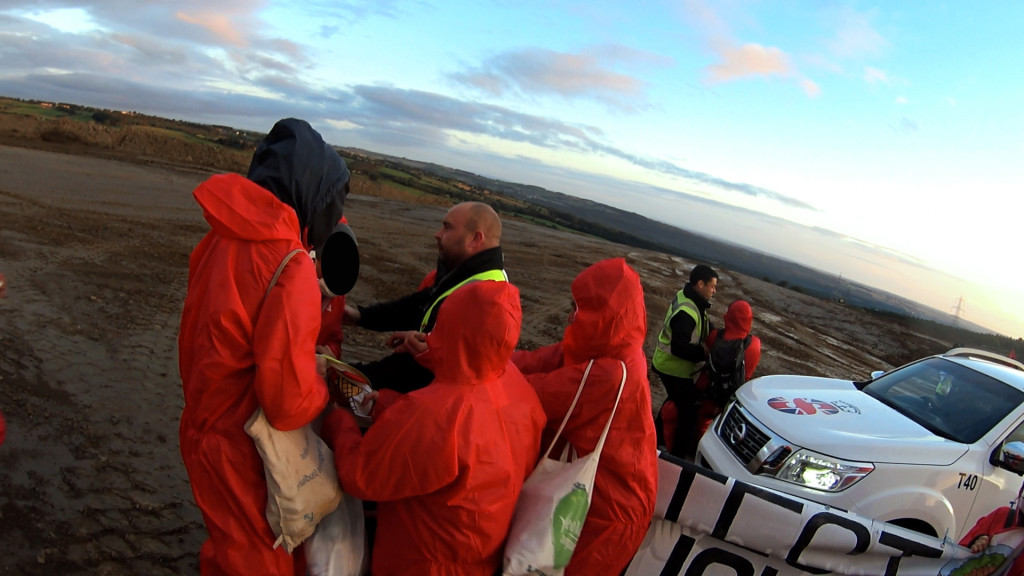
A tussle with security at Bradley (photo via Glen Black)
16.54 Daniel – Coal Action Network
I think I would just go into more detail on Margam, which was operated by Celtic Energy. And although Celtic Energy pulled a similar trick at all four of its coal mining sites, Celtic Energy particularly screwed over people living around Margam in Park Slip in South Wales. They lobbied the council planning board to give them an extension to the coal mine. And they said ‘we’ll use the money that we earn from this extension to pay for the restoration’. And the council who were looking at a huge liability if Celtic were to walk away, which they could because they’d sold the land already, they were held over a barrel. And so they said ‘yes, fine, you can have this extension. We just need to restore this massive void that you’ve dug out, to put the soil back’. Celtic Energy said ‘yeah, yeah, yeah. Great, we’ll do it’. At the end of that extension, the council came to Celtic Energy, [and] they said ‘right, great! It’s time for you to down tools, [and] restore the land. Keep your promise!’ Celtic were like, ‘yeah, we’ve not sold as much coal as we though we would. We need another extension’. At this point, the council said ‘no!’, ‘you’ve had enough, we’re not gonna do it any more’.
Unfortunately, only £5 million had been put to one side for restoration. £5 million might sound like a lot, [but] it’s a pittance to their amount that was required to just drain the water that was accumulating in the site… Because of that the council took Celtic Energy to court to pay for the restoration they’d promised to do. And over the course of that court process, the water had been filling into this coal mine, and just draining that water would cost over £10 million. So the council had no option than to just dig a bit of a ditch at the top of the coal mine that would drain the water away, so it will stop it from overflowing and flooding to the residences below. So these people now live with this massive void of water massive millions of cubic metres of water near to their homes, and they feel that threat.
And Celtic Energy said to the council, ‘you know, if you don’t accept this proposal, well, we’re gonna turn off our pumps [that] keep maintaining the water levels where they are, you’ve got a few months. So not only did the council accept this proposal, they paid Celtic Energy to do that – to dig this ditch. They paid them that last £5 million because Celtic Energy had their gear there, it would cost more to pay another company to come in. And that’s just such a galling example of company abuse of power, and abusing the legal system that our state creates. And ultimately, it’s the local communities that always pay the price. And there are so many communities still living beside unrestored or poorly restored sites around England, Wales and Scotland. We’ll be releasing a report [update – it’s now been released] shortly on the state of restoration of coal mining sites around South Wales. So keep your eyes peeled for that. We’ll be sending a mailing out to our mailing list and it’ll be on our website.
19:52 – Tom – Corporate Watch
Anne and Daniel, thanks so much and [I] like really encourage people to check out the website and go on the mailing list and be ready to take action when it’s needed. And, we’re gonna go and get some dinner pretty soon. But thank you so much for speaking to me.
Okay, so that interview was recorded in late August 2022. And some things have changed since then. So I asked Daniel for an update.
20.16 – Daniel – Coal Action Network
It’s March 2023. and much has changed. The Whitehaven coal mine has been approved by the Secretary of State in December 2022. Since then, local environmental group SLACC [South Lakes Action on Climate Change] and Friends of the Earth have both launched legal challenges against that approval. And we’re looking at other ways that we can challenge the Whitehaven coal mine from progressing.
Ffos-y-Fran did submit an extension application just five days ahead of the planning permission running out on the sixth of September 2022. But that extension application is still being considered by the local planning authority. In the meantime, though, all reports indicate that the coal mining company has not stopped coal mining at Ffos-y-Fran despite the fact that the planning permission has run out. We’ve done everything that we can to highlight this, and to report it to the local planning authority, but they’ve just sat on their hands. As far as we’re aware, they’ve not done any independent investigation of what would be a serious breach of planning permission at the site, they are due to formally consider and make a decision on the extension application in April. That’s almost six months of coal mining at the site without planning permission for six months, that’s terrible!
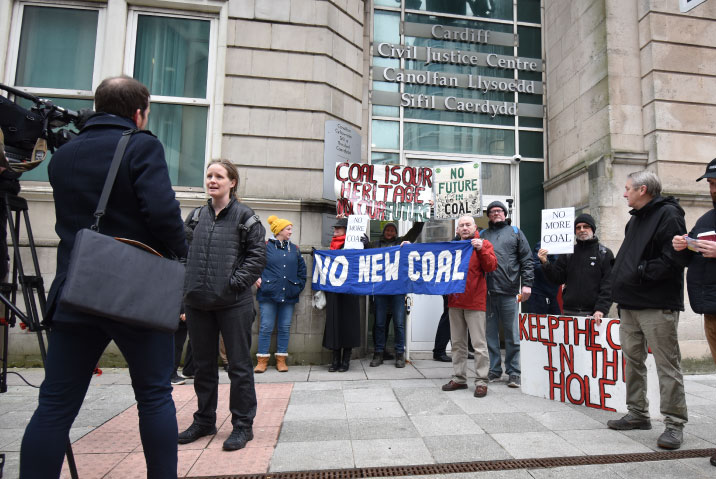
A demonstration outside the first day of the Aberpergwm judicial review hearing
At Glan Lash, that application for an extension is still alive. It is due to be considered by the local council of Carmarthenshire in three months from now. And we’ll be there to resist that.
In Scotland. slightly brighter news, the Scottish Government have announced a de facto ban on all forms of coal mining within Scotland, very similar to what they’ve done against fracking. We think that this means that the Lochinvar Coal Mine application is dead in the water.
And finally, at Aberpergwm, the deep coal mine in South Wales, that judicial review hearing is happening in a few days from now [cw note – it started on March 16th. A judgement is expected within three months]. So we’re very busy preparing for that, we’re optimistic that we’ll win. And that will save nearly 40 million tonnes of coal from being potentially extracted from that coal mine, and restore a bit of Welsh sovereignty around what happens in their future – ensuring that they can put into action, the strong anti-coal policies that they have.
Music by Oz Lockley
